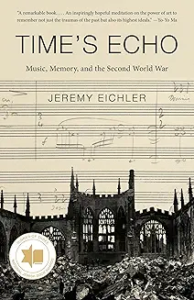Time’s Echo: The Second World War, The Holocaust, and The Music of Remembrance by Jeremy Eichler 2023
What a fascinating book Eichler, the chief music critic at the Boston Globe, has written. It’s a deep dive into music’s ability to memorialize and preserve history as well as its ability to touch our emotions. In addition, it’s a history of WWII and the Holocaust as expressed in the reactions, compositions, and lives of four composers—-Arnold Schoenberg, Richard Strauss, Benjamin Britten, and Dimitri Shostakovich.
I love classical music, and we attend many concerts during the year; however, my ability to understand the ‘language’ of music or to retain melodies or recognize classical pieces is quite limited. Nonetheless, I loved this book’s detailed and clear descriptions of the composers’ works, from Schoenberg’s “A Survivor from Warsaw” to Shostakovich’s “Fourteenth Symphony.”
Each of the four composers were deeply affected by WWII, and each of them either delved deeply into the Holocaust like Schoenberg or avoided it entirely like Britten, each working within the context of their own country and its relationship to the Shoah and how it dealt with it in the aftermath of the War. Schoenberg, the only Jew among the four, was deeply affected, fleeing his native Vienna in the early 1930’s and working in America where he was an early prophet of the catastrophe approaching Europe’s Jewry. In LA he wrote his never-finished opera “Moses and Aron” and his ‘Survivor From Warsaw’. The latter, lasting only 7 minutes, was so controversial in its frank and unblinking treatment of the Holocaust, that Koussevitsky of the Boston Symphony which had commissoned the work refused to provide its premier. Instead, the work had its first and hugely successful debut in New Mexico where a civic orchestra and a chorus of cowboys introduced it to the world.
Eichler’s book is full of fascinating stories like that one—Strauss’s support of the Nazi regime and his final “Metamorphosen” which may represent his regrets; Britten’s spectacular “War Requiem” performed in the Coventry Cathedral’s bombed out ruins and newy built building; Shostakovich’s refusal to bend to the Stalinist interpretation of the War and the harassment and threats to his music. Each of these composers translated their own and their country’s WWII and Shoah experience into moving musical works that continue to evolve for listener’s today.
In the Prelude, Eichler writes about “Time’s Echo”: “It is a book of stories, of sounds, and of places. The principal dramatis personae are four towering twentieth-century composers, Arnold Schoenberg, Richard Strauss, Benjamin Britten, and Dimitri Shostakovich. During the war years,they stood at four very different windows looking out onto the same catastrophe. Each responded to the rupture through intensely charged memorials in sound—pieces that especially when considered alongside the remarkable history surrounding their creation and reception, endure as some of the defining ethical and aesthetic statements of the twentieth century.”
This is an excellent book for those interested in history, WWII, the Holocaust, music, and biography, not an easy combination for any one volume. It’s well written and very successful. Eichler should be congratulated.



